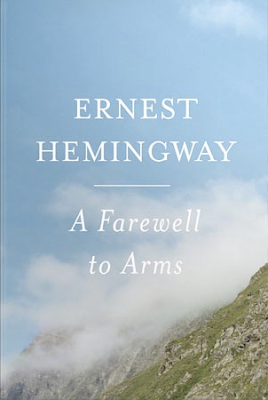Author: Ernest Hemingway
Published: 2003 (first published 1929)
Publisher: Scribner
Genre: Historical Fiction, Classic
Pages: 332
Source: Purchased
Rating: 2 stars
Goodreads | Amazon | Barnes & Noble
“If people bring so much courage to this world the world has to kill them to break them, so of course it kills them. The world breaks every one and afterward many are strong at the broken places. But those that will not break it kills. It kills the very good and the very gentle and the very brave impartially. If you are none of these you can be sure it will kill you too but there will be no special hurry.”My Thoughts
― Ernest Hemingway, A Farewell to Arms
Synopsis
The best American novel to emerge from World War I, A Farewell to Arms is the unforgettable story of an American ambulance driver on the Italian front and his passion for a beautiful English nurse.
Hemingway’s frank portrayal of the love between Lieutenant Henry and Catherine Barkley, caught in the inexorable sweep of war, glows with an intensity unrivaled in modern literature, while his description of the German attack on Caporetto—of lines of fired men marching in the rain, hungry, weary, and demoralized—is one of the greatest moments in literary history. A story of love and pain, of loyalty and desertion, A Farewell to Arms,written when he was thirty years old, represents a new romanticism for Hemingway. (Goodreads)
Oh Hemingway. Oh you. Why did you have to write this? Why couldn't you return home from being a WWI ambulance driver and leave it at that? It pains me to criticize any classic because classics are classics for a reason. They have remained untouchable for decades, standing the tests of time because of their popularity and how deeply they have resonated with a variance of audiences. And I have always loved classics. My favorite books fall in the classic literature genre. I eat classics for breakfast, lunch, and dinner. But Hemingway, I had to spit A Farewell to Arms out. I couldn't stomach this infuriating drivel. This is why I dreaded writing this review because this book frustrates me beyond belief and I don't even know how to rip apart a classic.
Let's begin by telling you why I read A Farewell to Arms. Thank you, Silver Linings Playbook. During the movie, Bradley Cooper's bipolar character throws said book out a window. I sympathize, seeing I was just as disgusted. I don't condone book burning, but this book almost turned me into a pyromaniac.
Instead of heeding this warning, I decided I must read A Farewell to Arms immediately, and I bought it right after the movie let out at a nearby bookstore. I wanted to know why it set Bradley Cooper's character into such a passionate, enraged frenzy.
Well, I found out. As always, Hemingway's writing was as dry as ever, something I've experienced before in his short story "Hills Like White Elephants," which I actually enjoyed. The dialogue is stilted and awkward, and I have yet to hear anyone talk like this. In fact, if anyone conversed as Hemingway's characters do, I would be concerned that they were either crazy or a robot trying to fit into society so he can take over the world.
I understand that there was a purpose behind Hemingway's choices. Catherine and Henry's simple, direct statements almost worked as a chant. By repetition, they may have hoped to believe what they were saying. They wanted to be happy and desperately in love and for their lives to be blissfully ignorant of the ongoing war. But it was just not so. Catherine and Henry were kidding themselves if they thought they could ignore the dismal truth of warfare, but they still kept trying with a stubborn persistence. For both of them, their love was a means of forgetting the war and pretending it didn't exist. But they could never completely escape their surroundings, and the rain, which Catherine feared as a symbol foreboding death, and the war kept creeping ever closer.
Hemingway wanted A Farewell to Arms to depict war's mundanity, and while I grasped this concept, I still found the execution disappointing and maddening and so confusing. The macho men, the misogyny, the awful depiction of Catherine as either certifiably insane or an air headed, love-stricken bimbo living only for her sweetheart; all of this combined provoked me, made me want to hurl the book against the wall with a battle cry. His minimalist descriptions left me unsatisfied, and I never felt the agony of wartime. I didn't sympathize with any of the characters because they were flat, undeveloped, and exaggerated. Every single one of them could have died, and I wouldn't so much as flinched.
And that ending. That was the last straw. After such an exhausting ordeal of making it through this entire book, that seemed so much longer than it actually was, you pull that Hemingway! Really? All I can say is you must have something against your readers. Oh, I understand the futility of war. I also understand the futility of reading A Farewell to My Sanity. I'm going to stick to Fitzgerald and Dickens.















So it seems he had good reason?
ReplyDeleteGreat review.
I love that you told us why and shared the scene.
Oh, he had a lot of reasons why. And now I got to learn for myself. Thanks! :)
DeleteIt's been FOREVER since I've read A Farewell To Arms -- like 10th grade which was 2003, so 10 years ago. I don't remember a whole lot about it, I think I liked it but I don't really remember.
ReplyDeleteAnyways, it sucks that you hated it.
But, I love that Bradley Cooper GIF, so it evens out.